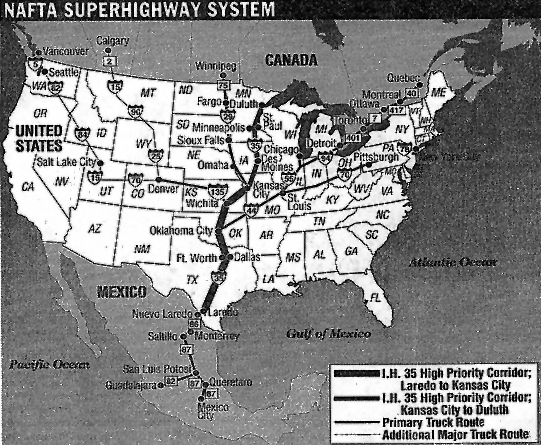|

Patrick J. Buchanan |
his is a
"mind-boggling concept," exploded Lou Dobbs. It must cause Americans
to think our political and academic elites have "gone utterly mad."
What had detonated the mild-mannered CNN anchor?
Dr. Robert Pastor, vice chair of the Council on Foreign Relations
Task Force on North America, had just appeared before a panel of the
Senate Committee on Foreign Relations -- to call for erasing all
U.S. borders and a merger of the United States, Mexico and Canada in
a North American union stretching from Prudhoe Bay to Guatemala.
Under the Pastor-CFR plan, the illegal alien invasion would be
solved by eliminating America's borders and legalizing the invasion.
We would no longer defend the Rio Grande.
"What we need to do," Pastor instructed, "is forge a new North
American Community. ... Instead of stopping North Americans on the
borders, we ought to provide them with a secure, biometric Border
Pass that would ease transit across the border like an E-Z pass
permits our cars to speed through tolls."
The Pastor-CFR project, for "economic integration" of Mexamerica, is
on the drawing board. North-south highways and railways would be
built to weld us together as the American Union was welded together
by the Northern Pacific, Union Pacific and Southern Pacific, and
Ike's Interstate Highway System.
|

NAFTA
Superhighway (click to enlarge) |
Speaking
in Madrid in 2002, Mexican President Vicente Fox declared: "Our
long-range objective is to establish with the United States ...
an ensemble of connections and institutions similar to those
created by the European Union, with the goal of attending to
future themes as important as ... the freedom of movement of
capital, goods, services and persons. The new framework we wish
to construct is inspired in the example of the European Union."
Critical element of the Fox post-NAFTA agenda: absolute freedom
of movement for persons between Mexico and the United States --
a merger of the nations. Foreign Secretary Luis Ernesto Debrez
put it succinctly in April 2005. What Mexico is about is
"complete integration" of the two nations.
To appreciate what Fox, Debrez, Pastor and the CFR wish America
to merge with, consider a few excerpts from the State Department
information sheet on Mexico.
While hundreds of thousands of illegal aliens marched beneath
Mexican flags in U.S. cities on May Day to demand amnesty,
Mexico's constitution "prohibits political activities by
foreigners, and such actions may result in detentions and
deportations."
"Crime in Mexico continues at high levels, and it is often
violent, especially in Mexico City, Tijuana, Ciudad Juarez,
Nuevo Laredo (and) Acapulco," State warns U.S. travelers. "Low
apprehension rates and conviction rates of criminals contribute
to the high crime rate."
"Women traveling alone are especially vulnerable. ... Victims
... have been raped, robbed of personal property or abducted and
then held while their credit cards are used at various
businesses and automatic teller machines. ... Kidnapping,
including the kidnapping of non-Mexicans, continues at alarming
rates."
When Fox proposed his merger of America and Mexico in a North
American Union, Robert Bartley, for 30 years editorial page
editor of The Wall Street Journal, declared him a "visionary"
and pledged solidarity: "He (Fox) can rest assured that there is
one voice north of the Rio Grande that supports his vision ...
this newspaper."
The American people never supported NAFTA, and they are angry
over Bush's failure to secure the border -- but a shotgun
marriage between our two nations appears prearranged. Central
feature: a ten-lane, 400-yard-wide NAFTA Super Highway from the
Mexican port of Lazaro Cardenas, up to and across the U.S.
border, all the way to Canada. Within the median strip dividing
the north and south car and truck lanes would be rail lines for
both passengers and freight traffic, and oil and gas pipelines.
As author Jerome Corsi describes this Fox-Bush autobahn,
container ships from China would unload at Lazaro Cardenas, a
port named for the Mexican president who nationalized all U.S.
oil companies in 1938. From there, trucks with Mexican drivers
would run fast lines into the United States, hauling their cargo
to a U.S. customs inspection terminal -- in Kansas City, Mo.
From there, the trucks would fan out across America or roll on
into Canada. Similar super-highways from Mexico through the
United States into Canada are planned.
According to Corsi, construction of the Trans-Texas Corridor,
the first leg of the NAFTA Super Highway, is to begin next year.



